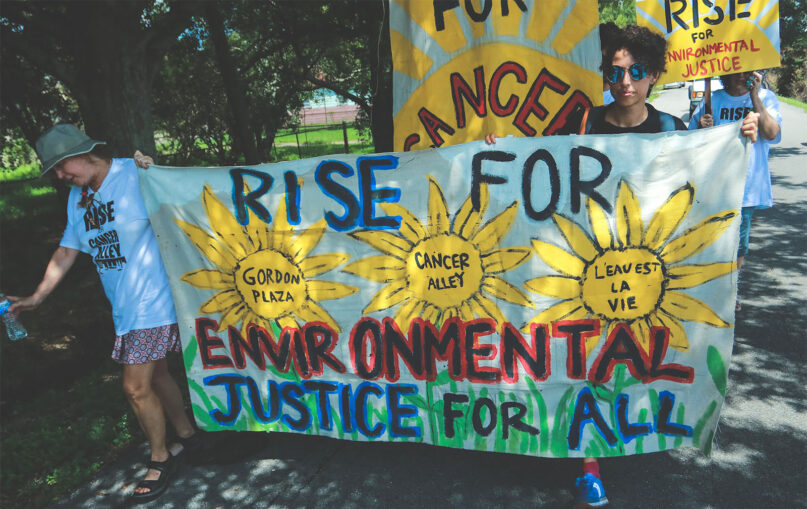(RNS) — When President Joe Biden signed the Inflation Reduction Act (IRA) into law in August, his signature signaled a new era in climate policy. The bill includes the largest government investments to address climate change. For faith leaders, it opens important opportunities to help protect God’s creation and to advance greater justice for our communities.
For years, grassroots advocates, including people from diverse faith communities, have been calling on lawmakers to address the greatest existential threat facing humanity. Congress failed to respond. Even as the worst impacts of climate change became more and more evident, Congress remained mired in partisan gridlock.
But climate advocates never lost hope. Even as the agonizing negotiations in the Senate lurched forward and back, thousands of constituents kept writing and calling their members of Congress, determined to make their voices heard. When the president put his signature on the IRA, their work was rewarded.
The IRA is a long-awaited step forward, but there is still much work to be done. As climate change worsens, we should also ask: How do we prioritize the most vulnerable among us?
Black, brown and low-income communities have historically borne the brunt of environmental harm. An Environmental Protection Agency study released in 2018, for instance, found people of color are far more likely to live near pollution sources. The study also found people under the poverty line are exposed to higher levels of fine particulate matter — a known carcinogen — than people living above the poverty line. The authors concluded that “results at national, state, and county scales all indicate that non-Whites tend to be burdened disproportionately to Whites.”
The lesson for policymakers and administration officials should be clear: Any climate action that fails to acknowledge this reality will not only be ineffective, but also morally compromised. Caring for all God’s creation requires a justice-based approach.
Fortunately, the Inflation Reduction Act allocates $60 billion for environmental justice, including grants to support community-led projects and credits for renewable energy sources in low-income areas.
However, the scope of environmental injustice demands far more. With the success of the IRA now in hand, lawmakers should prioritize passage of the Environmental Justice for All Act.
This bill has been informed directly by impacted communities. It would allow communities to hold polluters legally accountable for projects that use federal funds, direct federal agencies to further document the environmental and health disparities faced by those affected and fund more projects to right environmental wrongs.
Support for this bill is strong and growing. It has 13 Senate co-sponsors and 105 in the House — and Quaker advocates are working to get more.
Next month, hundreds of people will join the Friends Committee on National Legislation for our Annual Meeting and the Quaker Public Policy Institute. During the conference, Friends and advocates nationwide will lobby Congress to support the Environmental Justice for All Act.
In a recent interview, Dr. Robert Bullard — commonly referred to as the father of environmental justice — outlined the stakes of this moment clearly: “Climate change will make the inequities and disparities worse and widen that gap. That’s why this time, we have to get this right.”
The Quaker commitment to stewardship of the earth and environmental justice is not new, nor limited to our religious beliefs. Friends and people from many faith traditions have long held that we must respect the ecological integrity and sacredness of the natural world. Indigenous communities have led the way in practicing care of the environment from a spiritual basis.
It is now abundantly clear that this work cannot happen in a silo. Racism and discrimination touch every facet of our world, and the environment is no different. It is wrong for the consequences of pollution, waste disposal and the disruptive effects of climate change to fall disproportionately on the poor, communities of color and other marginalized peoples. As a faith community committed to honoring that of God in every person, we must work to not only heal the harm being done to our planet, but also do so in ways that promote greater justice for the most vulnerable among us.

Bridget Moix. Photo via FCNL.org
The work of caring for God’s creation and building a more just and sustainable environment will require all of us. I find hope in the dedication of advocates nationwide. Their tenacity drove passage of the IRA, and I’m confident that tenacity will be what eventually gets the Environmental Justice Act signed into law.
(Bridget Moix is the general secretary of the Friends Committee on National Legislation and leads two other Quaker organizations, Friends Place on Capitol Hill and the FCNL Education Fund. The views expressed in this commentary do not necessarily reflect those of Religion News Service.)





